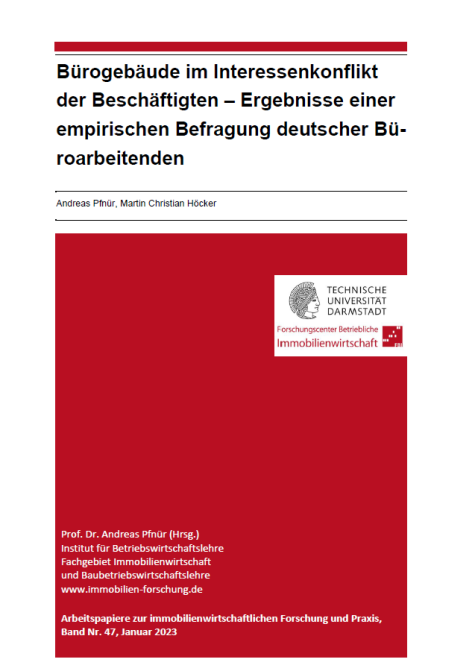Office building in conflict of interest with employees
Due to a severe structural change in the economy and society, in which existing business models are changing, outdated ones are being replaced, or new ones are being created, which thus exerts considerable pressure on cities, real estate and land, office properties are under intense pressure to adapt because of the many demands placed on them. In this context, office properties are viewed from various divergent perspectives:
- Real estate users are interested in efficiently usable space against the background of changed working environments.
- The ecological transformation of existing space against the backdrop of the climate crisis plays a decisive role among those concerned with performance.
- Property owners strive for sustainable returns and security emanating from office properties as an anchor of macroeconomic stability.

The rigid corset of real estate meets immense pressure for change and new flexibility requirements. At the same time, resolving the conflicting goals between the different perspectives is in the interest of all stakeholders to preserve the property's functionality. So far, the transformation of office properties has been discussed mainly by experts. So far, the voice of those most directly affected, the employees, has remained unheard. On closer examination, however, office workers take all three perspectives: as end users, they spend a large part of their waking hours in office properties, they act (indirectly) as investors in office properties via funds or company pension schemes, and as part of society they have an interest in preserving an environment worth living in over generations. The relevance of considering employees' concerns in the transformation of office real estate is increased by their negotiating position in the war for talent.
This study provides for the first time an overview of the concerns of office workers in the transformation of office real estate
Against this background, the Department of Real Estate Management and Construction Management at Darmstadt University of Technology, together with Swiss Life Asset Managers GmbH, investigated the perspectives of office workers on office properties in the transformation process in a cooperation project. The cooperation aimed to shed light on the perception of the different views of office workers on their office properties and to derive indications for successful transformation and the resolution of conflicting goals from their perspective.
In preparation for the survey, thirteen interviews were conducted with experts from the perspectives of a place of work, environmental sustainability and capital investment. The study of 1,000 German office workers was conducted via a crowdsourcing platform. The analysis results were also discussed with fifteen decision-makers and opinion leaders in a panel of experts.

The great importance of office properties from the user and investment perspective
Office workers were asked about their requirements for transforming office properties for the first time. In employees' perception, office properties have lost their exclusivity as a place for office work from the user perspective for the time being. For office workers, home offices and increasingly third-party work locations offer attractive alternatives. From the standpoint of ecological sustainability, the role of office properties in climate change still needs to be underestimated, although the respondents demand green properties. From an investment perspective, office properties continue to be in favour of retail investors. The meanings they attach to the requirements from the different perspectives quantify for the first time the demands on office properties according to their perceived role.
In line with this perception, the respondents demand the transformation of office properties in the future, above all, a maximisation of the buildings' benefits and an increase in capital market attractiveness, also against the background of private old-age provision.

Lessons learned for the real estate industry:
Against the backdrop of these results, the real estate industry players must align themselves more than ever with the requirements of the end users of the buildings:
- Employee representatives must represent benefit creation, participation in the investment success of the buildings and ecological transformation.
- Corporate real estate management must create attractive office environments and enable mobile working.
- For investors, new business opportunities arise from the attractiveness of coworking spaces and new investment products that enable employee participation in investment success.
- For policymakers, the results indicate that maximising the benefits of office real estate to maintain competitiveness and including employees in considerations of climate change mitigation require changes to policy strategies.
The complete report for you to download (in German)
Questions? Contact us!
| Name | Working area(s) | Contact | |
|---|---|---|---|

| Prof. Dr. Andreas Pfnür | pfnuer@bwl.tu-... +49 6151 16-24510 S1|02 31 | |

| Martin Christian Höcker M.Sc. Research assistant at the Department of Real Estate Management and Construction Economics | hoecker@bwl.tu-... +49 6151 16-24514 S1|02 38 |



